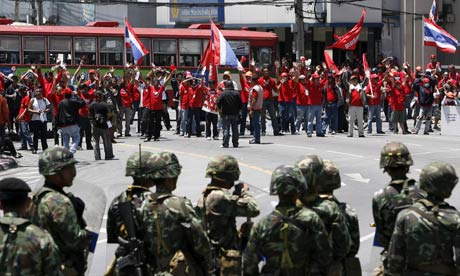BANGKOK – Thailand's coalition government teetered Monday after the Election Commission ordered the ruling party be dissolved for allegedly concealing campaign donations and the influential army commander said he supports a new vote.
The Election Commission ruling and the army chief's opinion buoyed anti-government protesters who have demonstrated for the past month pressing for Prime Minister Abhisit Vejjajiva's resignation. The standoff turned deadly on Saturday when troops tried to drive away a large group of protesters, resulting in clashes that left 21 people dead in Thailand's worst political violence in nearly two decades.
Partner parties in Abhisit's government also suggested he consider calling elections earlier than the end of year, the timeframe he offered so-called "Red Shirt" protesters, who have insisted on a vote within 15 days.
Thanis Sriprathes, deputy secretary-general of the Election Commission, told reporters Abhisit's Democrat Party was found guilty of failing to disclose — as required by law — that it received 258 million baht ($8 million) from TPI Polene, a cement producer listed on the Thai stock market.
A final decision on whether the Democrat Party should be dissolved, however, rests with the Constitutional Court. No date has been set to hear the case.
"This is a massive blow to the Democrat Party's legitimacy and suggests their wider alliance may just perhaps be starting to fragment," said Lee Jones, a lecturer in international relations at the University of London.
Abhisit suffered another blow when army chief Gen. Anupong Paochinda told reporters dissolving Parliament and calling new elections might resolve the country's political crisis.
The army chief was until now seen as a staunch backer of the prime minister. The apparent about-face puts Abhisit under renewed pressure given the army is an influential force in the country's politics — and has not hesitated to stage coups during previous bouts of political instability.
"If the issue cannot be resolved through political means, then Parliament dissolution seems to be a reasonable step ... I just want peace to prevail," Anupong told reporters.
At loggerheads in the yearslong struggle for power are the rural supporters of ousted Prime Minister Thaksin Shinawatra and the traditional ruling elite represented by Abhisit and his allies.
Abhisit's supporters include business leaders, the military brass, the judiciary and bureaucrats — supported by the urban middle class.
The root of the trouble goes back to 2006 when a coup drove Thaksin from power amid accusations of corruption. Thailand has seen three governments since then, but every administration has been dogged by street protests by rival groups.
In 2008, anti-Thaksin protesters besieged the government headquarters for months and occupied the airports for a week. The crisis was defused by a court ruling similar to Monday's that unseated the pro-Thaksin government. Subsequently, Abhisit became prime minister.
Meanwhile, Foreign Minister Kasit Piromya lashed out at Thaksin while on a visit to the U.S., accusing him of personally instigating the recent deadly clashes.
"He's a bloody terrorist," Kasit told a small group of academics and reporters, speaking Monday on the sidelines of a global nuclear summit in Washington. Abhisit canceled his trip to Washington because of the chaos.
Kasit compared Thaksin to dictators like Hitler, Mussolini and Stalin and to the terror group al-Qaida. He urged the United States to pressure Thaksin's supporters to turn away from violence and enter into negotiations with the government.
Thailand has seen three governments in the four years since the 2006 coup, and Kasit acknowledged that his country has "not found the right formula. We have not found the compromise."
"Thailand cannot go on behaving like a banana republic ... and become a problem child," Kasit said at the Johns Hopkins School of Advanced International Studies.
The repeated unrest has threatened to ruin the country's reputation as a stable haven for commerce, investment and tourism. The stock market closed 3.6 percent down Monday.
While the Election Commission ruling could set the stage for another change in power, it may not provide a permanent solution. There is also a chance that Abhisit's impending departure could fuel another round of counter-demonstrations by his supporters.
"While a dissolution of the Democrat Party may ease the current crisis, it can only be a temporary fix," said Tyrell Haberkorn, a researcher at The Australian National University in Canberra.
"The issues on which the current crisis turns — who can participate in politics and governance, who determines the meaning of justice, and what kind of speech is permitted — cannot be resolved in one fell swoop," she said in an e-mail interview.
Raucous cheers erupted at the main protest site when Veera Musikapong, a protest leader, announced the Election Commission's decision. "This is a victory for us. Our democracy heroes didn't die in vain," Veera said.
If the Democrat Party is dissolved, new elections will be called and the prime minister and top executives of the party will be barred from politics for five years.
The commission was scheduled to unveil its ruling on April 20, but announced it more than a week early without explanation. It came on the eve of a four-day holiday for Songkran, the traditional new year when many urban Thais visit relatives in the countryside. Many people feared the festival — where people douse friends and strangers alike with water — would be marred by the political unrest and demonstrations.
Earlier Monday, the Red Shirts paraded coffins carrying slain protesters through the capital saying they would not back down.
"Our position is clear. We want the Parliament dissolved now














